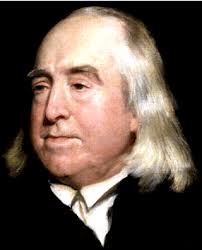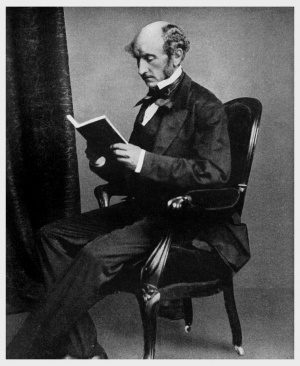Utilitarian Philosophy
Utilitarian philosophy or utilitarianism is a form of consequentialism that derives moral behavior from the outcome of one's actions. It declares as ethical an action which maximizes the total utility for all individuals directly affected by the actual consequences of said action. An early proponent of utilitarianism, Jeremy Bentham, referred to this belief as the "greatest happiness principle" or "the greatest happiness for the greatest number." Utilitarian philosophy raises ethical issues regarding the concept of "the greater good", moral agency, and value ethics.
Contents
Principles of Utilitarianism
Values
What constitutes utility has been an area of contention for many years and continues to be so. However, most classical utilitarians would argue that well-being, happiness and pleasure are the core values utilitarianism attempts to maximize. Because of this, utilitarianism is often compared with Hedonism.[1]
Principle of Utility
Being a moral theory, utilitarianism focuses on the consequences of an action to determine if an act is morally correct, rather than focusing on the intent of the actor. Furthermore, it uses the principle of utility[2] for this effort by suggesting that if the consequence results in a benefit for the greater good, then the action is right.
Impartiality Principle
Another key principle relied upon by classical utilitarianism is the impartiality principle[3] which states that no single person's utility holds higher precedence than another's, nor does their utility depend on if it is evaluated from the perspective of the agent or from the observer. The well being, happiness or pleasure of two individuals ought to be treated as equal in the utilitarian calculus. Furthermore, classical utilitarianism suggests that this impartiality be considered universally, i.e. for all people, rather than only the agent, the agent's immediate social network, or any other subgroup of individuals.[4] However, there is some ongoing debate spearheaded by Princeton University Philosopher, Peter Singer as to whether the impartiality principle should also apply to other species of animals as well.
Twentieth Century Utilitarian Philosophy
Utilitarianism can also be considered a form of consequentialism. Consequentialism is an ethical theory that focuses on the result to judge the act. Based on this view, it supports the act if it produces good, as being morally correct.
In the past two centuries, numerous variants of Bentham's original form of Utilitarianism have emerged. Each unique form aims to answer the practical question of how one should live their life in order to achieve the highest ethical good.
Act Utilitarianism
Act utilitarianism, or classical utilitarianism, suggests that in any given situation you should choose the action that produces the greatest good for the greater number. An example of this would be spending one's time on activities that are more likely to maximize well-being, such as volunteering at a soup kitchen, as opposed to an activity that would not maximize utility or one that would only benefit one's self. As volunteering at a soup kitchen would undoubtedly bring about greater well-being in the world than an activity that would only benefit one's self, volunteering ought to be the more morally right activity to pursue. Such a consideration would be seen as act utilitarianism.
Rule Utilitarianism
Rule utilitarianism suggests that we must live by rules that produce the greatest good for the greater good. Rule Utilitarianism is setting a precedent to contribute to the greater good forever. For example, volunteering every single free day you have.
Classical Utilitarians
Classic Utilitarians, like Jeremy Bentham and John Stuart Mill, identified good with pleasure. They can be equated with Epicurus, and are hedonists about value. Similarly, they believed we must maximize good and bring about the greatest amount of good for society as a whole.[5] Bentham and Mill were contemporaries. Mill would eventually be taught by Bentham after being approached by Mill's father.
Jeremy Bentham
Jeremy Bentham was an English philosopher and radical political man. He was primarily known for his moral philosophy which includes utilitarianism, specifically the overall happiness created for society affected by specific actions. Bentham was influenced by philosophers like John Locke and David Hume during the Enlightenment, which is what lead him to develop ethical theory grounded by the empiricist account of human nature. His account of motivation and value was hedonistic in the sense that he believed pleasure and pain are fundamentally valuable and ultimately motivate humans. According to Bentham, happiness is a matter of gaining pleasure and lacking pain.[6]
Led by Bentham and James Mill, the father of his future star pupil, John Stuart Mill, the group included David Ricardo, George Grote, Sir William Molesworth, John Austin, and Francis Place.
Both Bentham and Mill led this group in the name of political reform, believing that the current system under which the country was ruled by was antiquated. Many of their beliefs included universal male suffrage and economic policy that was not favorable to the aristocrats.
John Stuart Mill
John Stuart Mill was born in 1806 and died in 1873. He deeply influenced the British thought and political discourse of his time. His work was composed of a compilation of logic, epistemology, economics, social and political philosophy, ethics, metaphysics, religion, and current affairs. His more well-known publications are A System of Logic, Principles of Political Economy, On Liberty, Utilitarianism, The Subjection of Women, Three Essays on Religion, and his autobiography. His educational development was fostered mainly by his father who inspired him to learn several languages from a young age. Mill felt the influence of historicism, French social thought, and Romanticism, in the form of thinkers like Coleridge, the St. Simonians, Thomas Carlyle, Goethe, and Wordsworth. This inspired his search for a new philosophical radicalism that would be more open to limiting reform forced by culture and history. He would emphasize the growth of humanity, including the cultivation of dispositions of feeling and imagination, something he missed out on in his own education. [7]
Ethical Issues
The Trolley Problem
The Trolley Problem was put forth 1978 by philosopher Phillipa Foot, and describes a theoretical quandary where one is in a position to prevent a tragedy by making the choice of whether or not to pull a lever. A runaway trolley is headed for five incapacitated people stuck on the track, and cannot be stopped. If you pull the lever, the trolley will follow an alternate route only hitting one incapacitated person. Is it ethical to pull the lever? Do you have a moral duty to pull the lever?[8]
In order to make the decision, utilitarian philosophy can be applied. As utilitarianism describes as moral those actions with consequences that maximize total utility, then surely switching the lever to kill one instead of five is what you ought to do. But how can that utility be measured? Should we accept utilitarianism's impartiality principle and conclude that the happiness of five people continuing to live is better than one? If, for example, the five were all depressive and preferred to die more than the one preferred to live, should this knowledge affect our utilitarian calculus when deciding how utility should be maximized? Or if the one was a child and the five were all elderly, would this impact our utilitarian calculation? Consider also the impact on the actor's utility: would total utility decrease if they pulled the lever and forever considered themselves a murderer for causing the death of the one?
The trolley problem is further complicated by a slight variation in which the switch is replaced by a fat bystander. Now, if you push the bystander onto the tracks, the trolley will stop before it can hit the other five. From a utilitarian perspective, the problem is unchanged: the utility of one is weighed against the utility of five. But now, our moral intuitions do not clearly line up with the utilitarian solution. Furthermore, the utilitarian solution does not line up with either the virtue ethics or deontological solutions, which consider pushing the fat man to be an act of murder.[9]
The moral calculus of classical utilitarianism seems simple at first, but contains many hidden assumptions and subjective qualifiers that are difficult to quantify. The trolley problem and its solutions will soon have real-world implications. autonomous vehicles will need to make similar ethical judgments regarding the lives of bystanders and passengers when unpreventable accidents occur.[10]
Virtue Ethics
In his work "Utilitarianism", John Stuart Mill addresses his white, Christian audience by arguing against the notion that utilitarianism is immoral. Many Christians perceived utilitarianism as a godless doctrine, however, Mill contended that utilitarian ethics embody the preachings and practices of Christianity in its principle concern for the wellbeing and happiness of others.[11] Utilitarianism strives to take objective approaches in ethical dilemmas, however, much of its ethical philosophy can be attributed to the values of the philosophers themselves. Many utilitarian philosophers believed in deism and evaluating decisions based on a moral standard of happiness.[11] This view, however, aligns more centrally with European and American ideals, and has been criticized for its limitations. With the advent of the computer revolution, many scholars have urged that virtue ethics should replace utilitarian beliefs, which put too much emphasis on user experience and wellbeing.[12]. In contrast with the utilitarian philosophy, virtue ethics places emphasis on improving one's character and maximizing virtues, such as honesty and empathy. For example, if one were examining the ethical effects of Facebook under a utilitarian perspective one would might consider how Facebook usage correlates with self reported psychological well-being. Meanwhile a virtue ethics perspective would consider how whether Facebook user's act honestly on the platform and whether they are able to connect with users deep enough to emphasize with them.
Utilitarianism in AI
Utilitarianism is sometimes discussed as "utilitarian calculus" by philosophers studying AI. Algorithms in AI that use this calculus follow the utilitarian framework by selecting actions that maximize utility. When theorizing the singularity, some consider AI's use of utilitarian calculus'in regards to how future AI might be treated; an AI that strictly follows a utilitarian algorithm exhibits their lack of moral agency or consciousness[13].
See Also
References
- ↑ Moore, Andrew (2018). "Hedonism". The Stanford Encyclopedia of Philosophy. Retrieved April 21, 2019.
- ↑ Cavalier, Robert (2002). "Online Guide to Ethics and Morality". Carnegie Mellon Philosophy Department. Retrieved April 21, 2019.
- ↑ Jollimore, Troy (2018). "Impartiality". The Stanford Encyclopedia of Philosophy. Retrieved April 21, 2019.
- ↑ Sinnott-Armstrong, Walter (2015). "Consequentialism". The Stanford Encyclopedia of Philosophy. Retrieved April 21, 2019.
- ↑ Driver, Julia (2014). "The History of Utilitarianism". The Stanford Encyclopedia of Philosophy. Retrieved April 21, 2019.
- ↑ Sweet, William. "Jeremy Bentham". Internet Encyclopedia of Philosophy. Retrieved April 21, 2019.
- ↑ Heydt, Colin. "John Stuart Mill". Internet Encyclopedia of Philosophy. Retrieved April 21, 2019.
- ↑ Thomson, Judith Jarvis (May, 1985). "The Trolley Problem." The Yale Law Journal. 94 (6): 1395-1415. Retrieved from https://www.jstor.org/stable/796133 on April 21, 2019.
- ↑ Singer, Peter (2005). "Ethics and Intuitions". The Journal of Ethics. Retrieved from http://www.utilitarian.net/singer/by/200510--.pdf on April 21, 2019.
- ↑ Awad, Edmond, et. al. (October 24, 2018). "The Moral Machine experiment". Nature. 563: 59-64. Retrieved April 21, 2019.
- ↑ 11.0 11.1 Mill, John Stuart (1863). "Utilitarianism". Cambridge University Press. Retrieved April 21, 2019.
- ↑ Vallor, Shannon (August 2009). "Social networking technology and the virtues" p. 157-170
- ↑ Burton, Emanuelle, et al. “Ethical Considerations in Artificial Intelligence Courses.” AI Magazine, vol. 38, no. 2, 2017, p. 22., doi:10.1609/aimag.v38i2.2731.

